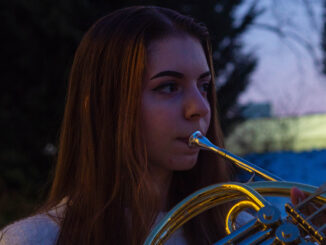Capri Scarcelli | A&E Editor
8/26/21
Oh my Lorde: Lorde is back and better than ever.
For the first time in four years, Lorde gave herself the “green light” for producing new music since her 2017 studio release, Melodrama. Away from media and Earth’s dark corners, the New Zealand pop singer tucked herself away in her home town to find solace in self-love, in peace and in song.
Thus came three sunshine-y singles to hold us over for the August 20 release of Solar Power — a compilation of pure happiness we have never seen before from her typically raw, emotional storytelling.
Since Lorde is always taking her fans through a road of social commentary and dotes of adversity, it only makes sense to lighten the tone and show her growth over the years.
That means the best way to do this is to go track-by-track.
The first song, “The Path,” actually sets the scene for the entirety of the album, starting with a low hum and quiet harmonies that meld into a bigger picture, like light creeping through a window. Crooning “teen millionaire having nightmares from the camera flash” to “now if you’re looking for a savior, well that’s not me,” Lorde highlights her past as a kind of pain she couldn’t always push away. Though partway through, she ushers in the phrase “let’s hope the sun will show us the path,” as a way of reconciling with her past and pushing forward in a new breath and a new light.
With that, the singer transitions into her second track — the album’s namesake and corresponding first single, “Solar Power.” This song took to social media kindly, becoming a quaint summer anthem for many as well as a trend on TikTok. This beachy, free-loving, hippie-dippie piece seemed to illuminate a care-free world that Lorde has welcomed us too, dipping our toes to bathing in sunlight. Whereas in the first track she alludes to her stage name not meaning the Christian Lord, she owns it in this song, singing “I’m kind of like a prettier Jesus.” She even nods to her disappearance from the spotlight, saying “and I throw my cellular device in the water/Can you reach me? No, you can’t.” This attitude and change of perspective shows her audience that it’s okay to take a step back from reality and account for your well-being, even if it seems like the world is calling your name. (Plus it has an awesome beat drop, so what more could you want?)
The third track, “California,” gives listeners more background on what fame looks like on-screen and how that translated for Lorde in real life. The first line “Once upon a time in Hollywood when Carole called my name/I stood up, the room exploded/and I knew that’s it, I’ll never be the same,” was an allusion to her first Grammy award in 2014 presented by Carole King — a surreal moment for the artist. From that point forth, however, Hollywood didn’t appear as shiny as it once seemed. The steady backbeat and breathy vocals carry the story to the end quite rhythmically until it fades out to “It’s all just a dream… I wanna wake up.”
“Stoned at the Nail Salon” is another single released over the summer that had fans pleasantly surprised with a more mellow tone. This song goes through a series of existential crises revolving around the coming-of-age troubles such as love and loss, aging beauty and, of course, change. The song feels like a modern lament in waltz time, as she cries “‘cause all of the songs you loved at sixteen you grow out of,” drawing to her hit single, “Royals,” that many teenagers grew up with and moved on from. This song is a way of telling her past self that she is okay exactly where she is, and that there is nothing to be afraid of.
“Fallen Fruit” is very similar-sounding, starting off the bat with a lovely harmony line powering through with only a simple strumming to back it. Kicking in with the instrumentals about halfway through, it reminded me of something off of Sgt. Pepper’s Lonely Hearts Club Band: very psychedelic-sounding with an ethereal feel. Lorde sticks to her theme of using nature as a crutch for this album, while also tying the biblical allusion to the temptation of fame and fortune for a young, aspiring artist.
The sixth track, “Secrets from a Girl (Who’s Seen it All),” seems like a song that will eventually end up on the radio. It’s very laid-back with a steady percussion, catering to a matured audience who has been through the teenage nightmare and has lived to tell the tale. The song has a very hopeful tone, ending with a monologue of advice to her younger self and her fans. According to an interview with Spotify, this song was inspired by one of her earlier works, “Ribs,” where she then took those two power chords and switched them around for the answers to the questions she asked herself as a young girl. This song is very cute and inspiring; it definitely exemplifies growth.
Transitioning to more of a ballad,“The Man with the Axe” is more somber than the other ones on this album, but according to Spotify Storyline, Lorde said that it’s “one of [her] favorites.” This song gives a fairytale feel to some of the misconceptions we have about love when we are young, and how badly it hurts when it is taken away for the first time. It’s simplistic, but haunting like an old ghost story kept in the family.
“Dominoes” seems to bring the album out of the shadows again. Very light-hearted, Lorde sings of an ex-boyfriend who once treated her poorly, but is now doing better elsewhere for his new lover. Accepting her past, she sings “must feel good to be Mr. Start Again,” keeping the narrative short and sweet to move on to brighter things. It feels like an “oh okay whatever” kind of acceptance rather than wallowing in pity as her younger artistry has shown. This song in itself shows how much she has grown over the years more than anything.
“Big Star” is also a shorter piece, singing of the promises she was given as a young artist and how that turned out for her. “I used to love the party, now I’m not alright,” she sings about her rise in stardom and the challenges faced with that. This re-evaluation is a part of life, and she accepts that by the end of the song.
“Leader of a New Regime,” on the other hand, seems to bring everything back to that summer narrative that she began with. This seems to bring the narrative back to present time and beyond reflection. I think harmonically this is quite unique, with a tiny piano trill that playfully toys with the guitar strumming. (Which, by the way, is a perfect transition not only in the song itself, but collectively in the album to show the passing of time and the need to move on from past tribulations).
The next song, “Mood Ring,” was another single released before the album dropped — and it is one of my favorites. It reminds me of that point in your life when you realize “so what now?” This song sort of dabbles in different modalities of self-care and spirituality that Lorde has experimented with in the past year or so, and her journey with that along the way. She jokes to herself “don’t you think the early 2000s were so far away?” reminiscing on a time where life didn’t require so much intentional time set aside for wellness and well-being. It’s fun, experimental and really seems like a piece that speaks to current day with an older-generational sound.
Last, we have “Oceanic Feeling,” which is a 6:31 piece in contrast with her staple of short-timed songs. This song felt like a lullaby, approaching a new chapter and a new sense of calm for the life ahead. It seems to stand in solidarity with her past and our experiences as well, moving forward slowly but surely. It’s a final breath, a journey coming to an end, but not completely as she turns to the future and wonders what her own daughter may be like. You can feel some of that old tension slip away in this song with that comforting reassurance: “I know you’re scared, well so was I.” It’s a great song to put the windows down and drive away with; a song where we can move with the tides together.”
Lorde’s story resonates with me more than I could imagine; we all carry our humanity differently, after all.
You can stream Lorde’s Solar Power on Spotify, Apple Music, YouTube and other corresponding services.




